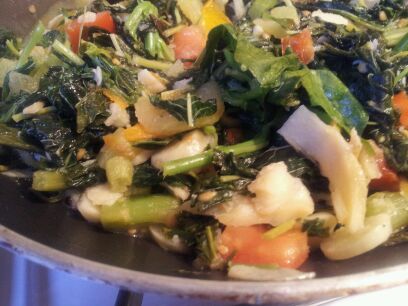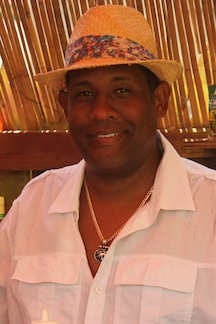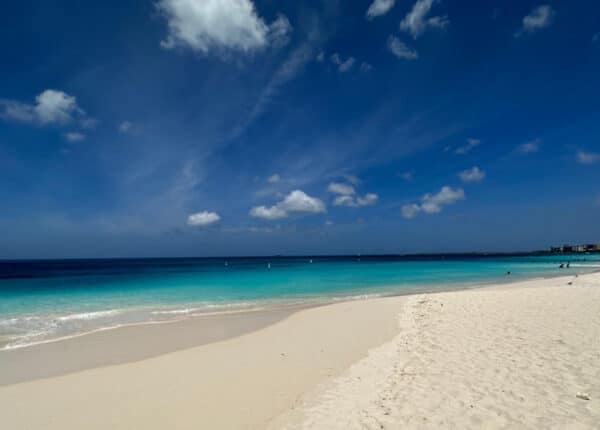From Jamaica to Trinidad, Finding the World of Caribbean Food in New York
By Nigel Spence
CJ Contributor
Food has been a part of my life since I can remember, and New York City has contributed an amazing amount to my learning process, my experiences and my knowledge of it.
It has intensified my cravings for “good” food, (which may explain my new-found girth) and is home to some Caribbean restaurants whose food is even more authentic in its style of preparation than where the dish originated.
That happens often here because food trends and product availability where the dish originated may have necessitated changes to the recipe, but here in New York, far removed from those changes, the authenticity is preserved.
Every day, I yearn for the chance to find those kinds of people and places, of which only a few are in the know. For this reason, I live the true New York Caribbean experience every day.
As a Jamaican living in New York for more than 20-plus years, I think I am one of a handful of people who recognizes just how fortunate I am. I am fortunate and privileged because I can “take a trip” to almost any country, sample their foods, experience their culture, observe their different mannerisms, watch them play sports, and even interact with their families without ever having to step foot outside of New York City — no passport required — no heavy suitcaes.
Though it seems kind of obvious when you stop to think about it, in reality, not many people make the effort to take advantage of the diverse Caribbean experiences that abound in this city.
I can tell you firsthand that no island in the Caribbean can send me into a tailspin of food delight and ecstasy like our own Queens County, NY.
In Queens, the most ethnically diverse neighborhood in the world, you can pull up to a tailgate party at a cricket match in the public park and sample Jerk Chicken from a Jamaican, Bhaigan Choka and a Sada Roti from a Guyanese (wash it down with a shot of Johnny Walker Black) or a Saltfish and Bake with Mauby from a Trini, all in three or four car lengths within a city park.
Where else can you find such one-stop-shopping for multi-Caribbean cultured food, sports and commentary all in one place but New York? The only problem is, we don’t intermingle much at these tailgate parties. We all seem to “stick to our own”; what we know and are familiar with. That is, until I arrive on the scene.
Apart from strange bedfellows, alcohol also makes for good barter, banter, bribes, bets, and exchange of food, funny cigarettes and phone numbers at tailgate parties.
Appleton VX rum is the weakness of the Bajan Cricket freak who is ever present at all the matches, with his beat-up 1972 Mercedes wagon outfitted with a 120-quart cooler permanently installed in the trunk. His perfectly seasoned flying fish is mine. I never forget to bring the VX. I don’t care for cricket much.
As much as I love my Jamaican culture, I still believe that the food knowledge, curiosity, respect and acceptance within the different island nations have a long way to go.
As Caribbean people, we embrace unity among cultures and races that reflects itself in our cuisine. Yes, we pay tribute to the “English,” “Spanish,” “Portuguese” and the many other nations who have been a part of our turbulent history for their culinary contributions to what is now considered our own unique Caribbean cuisine; but how many of these cuisines really “cross-over” with each other?
How unified are we as Caribbean nationals as it pertains to gastronomy? How many Jamaicans really know what “Bhaji” or “Chandon Beni” is? How many Guadeloupians make “Run Down” or “Cou Cou” at home? How many Cubans step into a Jamaican restaurant to order “Ackee & Saltfish,” or even know what it is, despite the fact that they literally sit on top of Jamaica in terms of geography?
So, we generally remain disparate as a Caribbean “nation,” apart from a few exceptions such as a major sporting event or the West Indian Day Carnival in Brooklyn, NY.
Even then, the West Indian Day Carnival in Brooklyn, on the level of food, is not a true representation of the many island nations that call Brooklyn home, though it’s a good start.
I got very annoyed at myself not too long ago when an American patron came into my restaurant and belted out a laundry list of dishes she had the pleasure of consuming on a recent island getaway. I could only decipher five of the nine, and worse, could only claim to have had three of the five!? Of course, like a true Jamaican, I just “went wid di program” and said that I had had them all before! I then retreated to my kitchen and kicked myself in the rear for being so “Caribbean Dumb!” Despite taking great pride in being a true foodie, I was stumped during her Caribbean food knowledge segment!
Yes, some fruits and vegetables are very similar and called a different name in other islands, but preparation methods tend to differ considerably. More significantly, a few of these fruits and vegetables grow in abundance on some islands, but are not consumed at all by the natives, yet command a premium price on another tropical shoreline. I won’t get into the story about the Jamaican who visited another island and chose his particular hotel because of the fully loaded Ackee tree in the backyard that nobody seemed to bother about.
A very important contributor to Caribbean cookery, Guyanese and Trinidadian cuisine in particular, are the East Indians. Many of the popular dishes that grace the tables on these islands are full of flavour, depth and spice, and even conform to the diet restrictions of vegetarians and vegans alike, without touting itself as “vegetarian” or a “vegan” meal.
They also contain many spices that scientists are now pushing as the “spices of life”, including turmeric and ginger. This is largely because many of the East Indians came to these islands following a strict vegetarian diet, and brought their indigenous spices with them. They learned to modify their cooking to incorporate the vast array of fruits and vegetables available in the islands with their spices, to make the dish taste like home, creating a whole new dimension in cooking on the island.
Although authentic Indian restaurants have become very popular with Americans for the vegan selections in particular, I don’t believe their flavour profile is a match for a Caribbean cook that “set dem mind” to the pot and “put dem foot inna it” … and a Scotch Bonnet or Ball a’ Fire pepper wid’ no behavior doesn’t hurt either.
I believe that if the Trinidadian and Guyanese restaurants here in the United States made the public more aware of the fact that much of their menu is actually “vegan friendly”, they would see far more of the “other” Caribbean nationals, including Rastafarians and vegans of all cultures, enthusiastically “tearing up” some Tomato Choka, Corilla and Potato Curry, Doubles wid plenty peppa, or even some Bora.
So let’s take a second look at Caribbean cuisine with a New York state of mind and make every effort to get more curious and involved. Take the friend visiting you from home on a taste of the tropics tour of this diverse city. Even though you may be from Martinique, bypass the “Colombo” for something new and exciting. Get out of your comfort zone for a moment and bolt through the door of that Haitian or Antiguan restaurant you pass every day but never have the nerve to check out. Walk straight in and ask for the first thing you see on the menu that makes you scratch your head in wonder! That is what I do!
And, if you are not as adventurous as some of us, read the small print that might give you some clue of how the meal is prepared … better ye, just ASK.
Most people only bite what they are eating, so don’t worry, it’s the best time for your query!
Nigel Spence, a Culinary Institute of America alumnus, was born in Kingston, Jamaica. Nigel freelanced at the Television Food Network for three years where he worked with culinary luminaries such as Mario Batali, Bobby Flay and Emeril Lagasse. Chef Spence has appeared twice on Throwdown with Bobby Flay where he emerged the victor in cook offs against the Food Network star and was featured on CBS when he appeared on Tony’s Table as well as ABC’s Neighborhood Eats, NBC’s The Today Show, Sirius’ Everyday Living with Martha Stewart and TVFN’s Chopped. The acclaimed and New York Times-reviewed Ripe Kitchen and Bar is Mr Spence’s first entrepreneurial endeavour.









